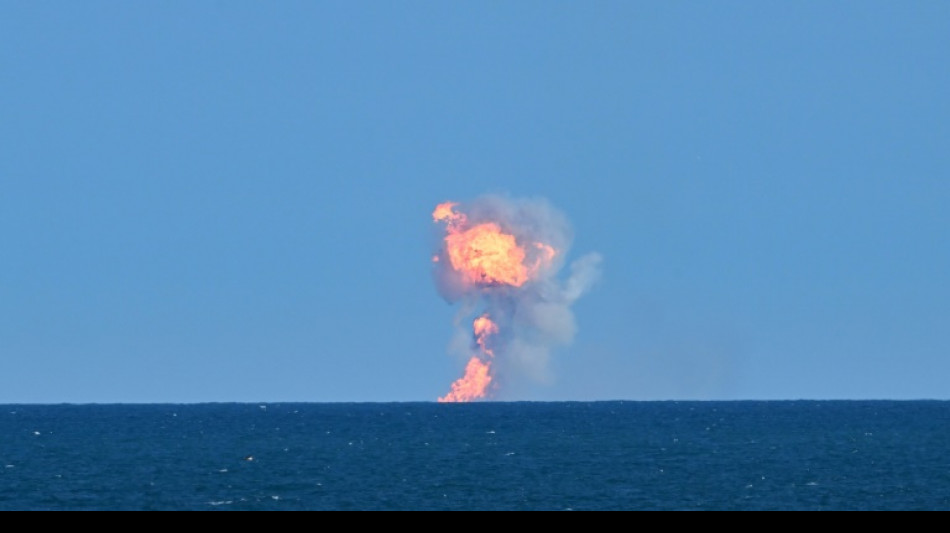
SpaceX fails to repeat Starship booster catch, as Trump watches on

SpaceX flew its latest test flight of its Starship megarocket on Tuesday, with President-elect Donald Trump joining Elon Musk to witness the spectacle firsthand in the latest sign of their ever closer ties.
But the Republican leader was deprived of the chance to see the descending first stage caught in the launch tower's "chopstick" arms, an engineering marvel demonstrated by the company last month and one he personally lauded during his election victory speech.
Instead, the massive Super Heavy booster made a more subdued splashdown in the Gulf of Mexico.
Company representatives cited unmet technical criteria, dampening the triumph of an event attended by an array of Trump-world figures.
Space X founder and CEO Musk has been a constant presence at Trump's side since the incoming president's election victory, joining him at a meeting with Argentina's President Javier Milei and even at a UFC bout.
Trump's decision to travel to Musk's home turf was the latest sign of the burgeoning bond between the billionaire duo, which has raised questions over possible conflicts of interests given SpaceX's lucrative contracts with NASA and the Pentagon.
Flying in from his Mar-a-Lago home, Trump greeted Musk warmly on Tuesday afternoon, sporting a red MAGA hat as the pair headed off to watch from the control tower of the company's Starbase in Boca Chica, Texas, where Starship blasted off at 4:00 pm (2200 GMT).
Tuesday's launch marked the quickest turnaround between test flights for the world's most powerful rocket, a gleaming, 400-foot-tall (121-meter) stainless steel colossus central to Musk's ambition of colonizing Mars and making humanity a multiplanetary species.
Musk aims to launch the first uncrewed missions to the Red Planet as early as 2026, coinciding with the next "Mars transfer window" -- a period when the journey between Earth and Mars is at its shortest.
NASA is also counting on a specialized version of Starship to ferry astronauts to the lunar surface later this decade under its Artemis program.
- Stuffed banana -
Flight six of Starship was seen as a test of whether SpaceX's first booster catch was pure precision or relied on a stroke of luck after Musk -- perhaps inadvertently -- disclosed how close the last flight came to disaster.
In a clip posted to X showcasing his gaming chops in "Diablo IV," sharp-eared fans caught an employee briefing him that the Super Heavy booster was "one second away" from a system failure that could have spelled catastrophe.
Starship's upper stage meanwhile made a partial orbit of Earth, reentered the atmosphere and splashed down in the Indian Ocean around an hour and five minutes after launch.
SpaceX employees erupted in cheers during a live feed watched by nearly nine million viewers, as the upper stage executed a near-vertical daylight splashdown off Australia's northwest coast, sending up a towering plume of water vapor before tipping over.
Key milestones included reigniting Starship's Raptor engines for the first time in space and trialing new heat shield materials. The flight also carried Starship's first ever payload -- a stuffed banana -- and served as a swan song for the current generation of Starship prototypes.
With twice the thrust of the Saturn V rockets that powered Apollo missions, Starship is the most powerful rocket ever built.
Musk has already teased that its successor, Starship V3, will be "3X more powerful" and could take flight in about a year.
The flight comes as Musk is riding high on Trump's November 5 White House win, having campaigned extensively for the returning Republican leader, as well as donating staggering sums from his own fortune to the cause.
His loyalty has paid off. Musk has been tapped to co-lead a new "Department of Government Efficiency" -- or DOGE, a cheeky nod to the meme-based cryptocurrency Musk loves to promote.
That in turn has led to concerns Musk could engage in "self-dealing" as the CEO is poised to straddle the line between government insider and corporate titan.
Y.Destro--PV
